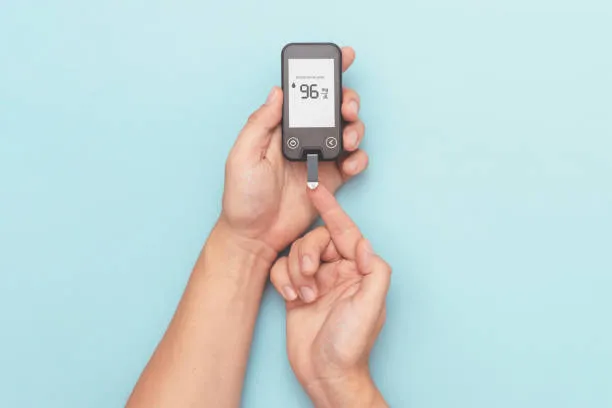


Serotonin
Serotonin, also known as 5-hydroxytryptamine or 5-HT, is a neurotransmitter and hormone that is essential for regulating blood sugar levels, insulin sensitivity, and gut health. Increasing evidence suggests that an imbalance in serotonin is linked to both Type 1 and Type 2 diabetes, insulin resistance, and metabolic conditions such as PCOS.
How Does Serotonin Impact Blood Sugar and Insulin?
Enhancing Insulin Sensitivity in Muscles and the Liver
Regulating Appetite and Cravings
| Condition | Serotonin Effect | Impact on Blood Sugar |
|---|---|---|
| Low Serotonin | Poor insulin secretion, increased stress, cravings for sugar | Higher blood sugar, increased insulin resistance |
| High Serotonin | Increased insulin sensitivity, improved gut function | Lower blood sugar (but excessive serotonin may cause hypoglycemia) |
| Fluctuating Serotonin | Irregular appetite and energy metabolism | Unstable blood sugar, increased diabetes risk |
Individuals with diabetes or prediabetes often experience low or fluctuating serotonin levels, which can negatively impact blood sugar regulation.
The Connection Between Gut Health, Serotonin, and Blood Sugar
Dysbiosis and Its Impact on Diabetes
The Role of Serotonin and GLP-1 (Glucagon-Like Peptide-1)
The Impact of Medications on Serotonin and Blood Sugar
Metformin's Influence on Serotonin
Interactions Between Insulin Therapy and Serotonin

Dopamine
Diabetes is a long-term condition that impacts the body's ability to manage blood sugar (glucose). It arises when there is inadequate insulin production (Type 1 diabetes) or when the body develops resistance to insulin (Type 2 diabetes). Dopamine is crucial in managing metabolism, appetite, and insulin sensitivity. When dopamine levels are low, it can result in poor impulse control, heightened cravings for sugary foods, and diminished motivation for physical activity, all of which can lead to insulin resistance and weight gain—significant risk factors for Type 2 diabetes. Furthermore, issues with dopamine are associated with metabolic disorders as it influences energy balance and glucose management.

Noradrenaline
Diabetes, particularly type 2 diabetes, is closely linked with noradrenaline (norepinephrine), as noradrenaline influences insulin secretion, glucose metabolism, vascular tone, and inflammation—all of which are critical factors in the onset and complications of diabetes.
Let us explore how noradrenaline both affects and is affected by diabetes in a thorough, scientifically-supported manner.
Noradrenaline & Diabetes: A Profound Link
Noradrenaline & Insulin Secretion
Noradrenaline interacts with alpha-2 adrenergic receptors located in pancreatic β-cells, where it:
Noradrenaline & Insulin Resistance
The final outcome: Continuous high levels of noradrenaline = insulin resistance = increased blood sugar levels.
Autonomic Nervous System (ANS) Dysfunction in Diabetes
As a result, they become less sensitive to hypoglycemia, raising the risk of severe low blood sugar episodes—known as hypoglycemia unawareness.
Diabetes is linked to chronic stress, which:
Encourages central obesity, inflammation, and insulin resistance
Diabetes, particularly type 2, involves more than just sugar—it encompasses hormonal miscommunication within the body. Several essential hormones, including Adrenaline, GABA, DHEA, and Cortisol, greatly affect blood sugar management, insulin sensitivity, and metabolic equilibrium. Disruption of these hormones can lead to the onset or exacerbation of insulin resistance and diabetes.
Adrenaline
Adrenaline, the body’s acute stress hormone, causes an increase in blood sugar by promoting glucose release from the liver. While beneficial in emergencies, chronic surges of adrenaline—due to ongoing stress, insufficient sleep, or anxiety—result in sustained high blood sugar levels, aggravating insulin resistance and complicating diabetes management.
GABA (Gamma-aminobutyric acid)
GABA is a soothing neurotransmitter that also influences insulin secretion. Low levels of GABA are associated with diminished pancreatic function, hindered insulin release, and heightened blood sugar fluctuations. Additionally, GABA aids in emotional regulation, and insufficient levels often lead to stress-induced eating or unhealthy dietary choices that exacerbate diabetic symptoms.
DHEA (Dehydroepiandrosterone)
DHEA helps mitigate the effects of cortisol and enhances insulin sensitivity. Reduced DHEA levels correlate with increased visceral fat, inflammation, and impaired glucose metabolism—all of which are fundamental contributors to insulin resistance. Enhancing DHEA levels can promote improved metabolic function and blood sugar regulation.
Cortisol
Cortisol, the primary stress hormone in the body, significantly influences blood sugar levels. When cortisol remains elevated—due to emotional stress, sleep disturbances, or excessive exercise—it instructs the liver to release additional glucose. Over time, this can result in persistently high blood sugar and insulin resistance, both of which are characteristic of diabetes.
Glutamate
Glutamate is a non-essential amino acid and serves as the primary excitatory neurotransmitter in the brain.
It also plays a role in:
Elevated Glutamate in Type 2 Diabetes
Individuals with type 2 diabetes frequently exhibit increased plasma glutamate levels.
This may indicate:
Numerous studies have indicated that:
Glutamate and Beta Cell Function
Insulin-producing pancreatic beta cells exhibit sensitivity to glutamate.
An excess of glutamate may:
Brain Insulin Signalling and Glutamate
Insulin and glutamate are closely interconnected in the brain.
Diabetes disrupts brain insulin signalling, which:
Gut Microbiome and Glutamate
Gut bacteria are responsible for producing and metabolizing glutamate.
Individuals with diabetes frequently experience dysbiosis, which can: